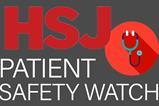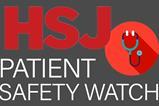HSJ hosts the Patient Safety Watch newsletter, written by Patient Safety Watch chief executive James Titcombe.
Good afternoon and welcome to the latest edition of the Patient Safety Watch newsletter.
Government launches call for evidence on duty of candour
The Department of Health and Social Care has launched a call for evidence as part of its review into the duty of candour, which has been sparked by concerns healthcare providers are not always applying it consistently.
The duty of candour refers to the requirement for healthcare providers to be open and transparent, including saying sorry when necessary. Like so many pivotal moments for patient safety, the duty of candour originates from a tragic event – the avoidable death of Robbie Powell – and his father Will’s subsequent tireless campaign for change and for Robbie’s Law.
Health minister Maria Caulfield said: “I spent 20 years working as a nurse in the NHS and I know how important it is that health and care providers are open with patients and their loved ones – especially if something has gone wrong.
“I want to ensure that our system of duty of candour is kept up to date, so I urge anyone with views or experience to respond to the call for evidence to help inform our review, which will ensure that honesty and integrity remain at the heart of our health and social care services.”
Patient safety commissioner Henrietta Hughes added: “I welcome the fact that duty of candour is being reviewed because it is important that people do not struggle to get information when something has gone wrong. Working with patients as partners is an opportunity for us to learn and improve.”
My views? A review of the statutory duty of candour is overdue and welcome. Common themes I hear when talking with staff about duty of candour is that it can feel very process driven, where rigid timescales and formality can sometimes overshadow the human aspects and needs. Perhaps there is room to make it more flexible and personal?
I’m sure there will also be calls for clearer lines of accountability for when the duty of candour is breached and more to be done to support psychological safety and a culture where staff feel safe and supported to speak openly when things go wrong.
For me, I also think the duty of candour should be extended to not just include openness and transparency when things have gone wrong, but to proactively include information about known patient safety issues and risks, so patients can make informed decisions about their care and be empowered to play a more active role in their own safety. Your thoughts are welcome!
In other news this edition…
All deaths to be reviewed by medical examiner or coroner from September
The DHSC has announced that, from 9 September 2024, all deaths not referred to a coroner will be examined by a medical examiner in a move designed to improve transparency and safety in light of cases like Harold Shipman and Lucy Letby.
Ms Caulfield said: “At such a difficult time, it’s vital that bereaved families have full faith in how the death of their loved one is certified and have their voices heard if they are concerned in any way.
“The measures I’m introducing today will ensure all deaths are reviewed and the bereaved are fully informed, making the system safer by improving protections against rare abuses.”
National medical examiner Alan Fletcher added: “I am delighted that the statutory basis for independent medical examiners is confirmed. This will ensure all bereaved people have a voice, supporting patient safety learning and improvement, including through accurate coroner referrals.”
My thoughts? This is welcome news and it is particularly good to see an emphasis on engagement with bereaved families as a central part of the reforms.
One small frustration, however, is that stillbirths remain outside medical examiners’ (and coroners’) remits. The Morecambe Bay Investigation report (2015) explicitly recommended extending the medical examiners’ system to include stillbirths. Morecambe Bay Investigation chair Bill Kirkup told me he was “disappointed the recommendation still hasn’t been addressed 10 years on”.
Last fortnight’s newsletter covered the Health and Social Care Select Committee’s recent critical report of the government’s record on implementing patient safety inquiry recommendations. Here is another example of that same implementation problem.
Staff inappropriately blamed for retained swabs, says watchdog
A report by the Health Services Safety Investigations Body has found trusts tend to place too much blame on staff when a surgical swab is left inside a patient instead of exploring the wider factors which may have led to the incident. HSSIB found this often led to providers recommending staff get more training, rather than making recommendations aimed at improving the process of keeping track of items like swabs.
HSSIB senior safety investigator Saskia Fursland said: “Whilst the number of retained swabs appear relatively low, they continue to occur and there has been up to 23 patients in a year experiencing an incident and the negative patient outcomes that can come with it – from distress and trauma, the risk of infection, to further surgery and prolonged hospital stays.
“What we have called for in our report is for those working in healthcare to think differently about the issue and apply a view of the whole system that underpins the process – examine all the factors that influence the swab counting rather than just focusing on individual actions or behaviours.”
More great work by HSSIB who are setting the standard for system-focused investigations in healthcare both here and internationally.
Man suffered psychotic episode after hospital did not warn him of drug side effects, watchdog finds
The Parliamentary and Health Service Ombudsman has examined the case of 61-year-old Andrew Holland, who suffered a psychotic episode after he was not warned about an extreme side effect of the steroids he had been prescribed.
The PHSO said there had been a missed opportunity to fully explain the possible side effects to Mr Holland, leaving him unable to make a properly informed decision about whether to take the medication.
PHSO chief executive Rebecca Hilsenrath said: “This must have been a terrifying experience. It is an act of trust to put yourself under the care of others and trust depends on information and understanding. No one wants to suffer a psychotic episode – no one should do so as a result of medication without fully understanding and accepting the risk.”
Sharing some good stuff…
Patient safety rights charter launched in Chile
Those of you who follow social media closely (or you may have been lucky enough to go?!) will be aware this week has seen an important patient safety event in Chile – the sixth Global Ministerial Patient Safety Summit.
The summit marked the official launch of a new patient safety rights charter. Developed by the World Health Organisation, the charter sets out 10 patient safety rights and aims to “support stakeholders in formulating policies and legislation, and in developing mechanisms to ensure that patients’ rights to safe care are respected, protected and fulfilled”.
Countdown to Congress
What is the one truly must-attend patient safety event in the calendar? That’s right, the HSJ Patient Safety Congress! This year’s event is fast approaching, taking place in Manchester on 16-17 September. This year’s theme is ‘Honest Conversations: Creating Safety in a System Under Pressure’.
As a member of the congress advisory board, it’s been exciting to see the programme develop. This year’s event is again chaired by the brilliant journalist and The Sunday Times health editor Shaun Lintern and the agenda is looking better than ever. You can see the confirmed speakers so far, download the programme and book your place here.
I’m looking forward to chairing again and sharing some early insights from this year’s Patient Safety Watch research project, in partnership with Imperial College London, looking at the national state of patient safety and the direction of travel. I hope to see many of you there.
NHS Practitioner Health service gets reprieve
If you are active on social media, you will have seen the uproar last weekend stemming from the sudden announcement made last Friday that the NHS Practitioner Health service would stop taking new referrals. The service provides vital 24/7 crisis support for healthcare staff and is considered a lifeline by many.
The reason this story is in the ‘good stuff’ section is because of what happened next. In summary, the medical community rallied together with a huge show of unity, support and protest at the decision. An open letter was written to NHS England chief executive Amanda Pritchard and health and social care secretary Victoria Atkins which quickly gained more than15k signatures. The uproar was so large that by Monday, the decision was U-turned.
Ms Pritchard posted on X saying “we don’t always get things right”, adding her thanks to “everyone who raised concerns about the changes”. Credit is due to everyone who spoke out but also to Ms Pritchard for role modelling the right way to listen and respond to concerns. It can be done!
A couple more quick shares for this edition
Firstly, a plug for a fantastic, funded PhD opportunity at the University of Leeds, looking at the role of non-executive directors in patient safety oversight in the NHS in England. The PhD is supported by a great supervision team in a department led by two of the best patient safety researchers in the country. If any readers are interested, more information is available here.
And finally, a shameless plug for a blog I’ve written about maternity safety. It shares some personal reflections on where I think we are at the moment and what more we could do to get back on the right track.
That’s all for this edition, but before signing off I’d like to quickly mention chief nursing officer Dame Ruth May’s announcement of her retirement this week. I’ve known Ruth for many years and although we have often discussed difficult and highly emotive issues, her kindness, empathy and integrity have always shone. It’s clear from reading the responses to the announcement on social media just how many other people feel the same.
Thank you for all you have done Ruth. We wish you all the best in whatever you do next.
That brings this newsletter to an end. Please look out for our next edition in two weeks’ time. In the meantime, thanks for reading and stay safe.
James Titcombe
































No comments yet